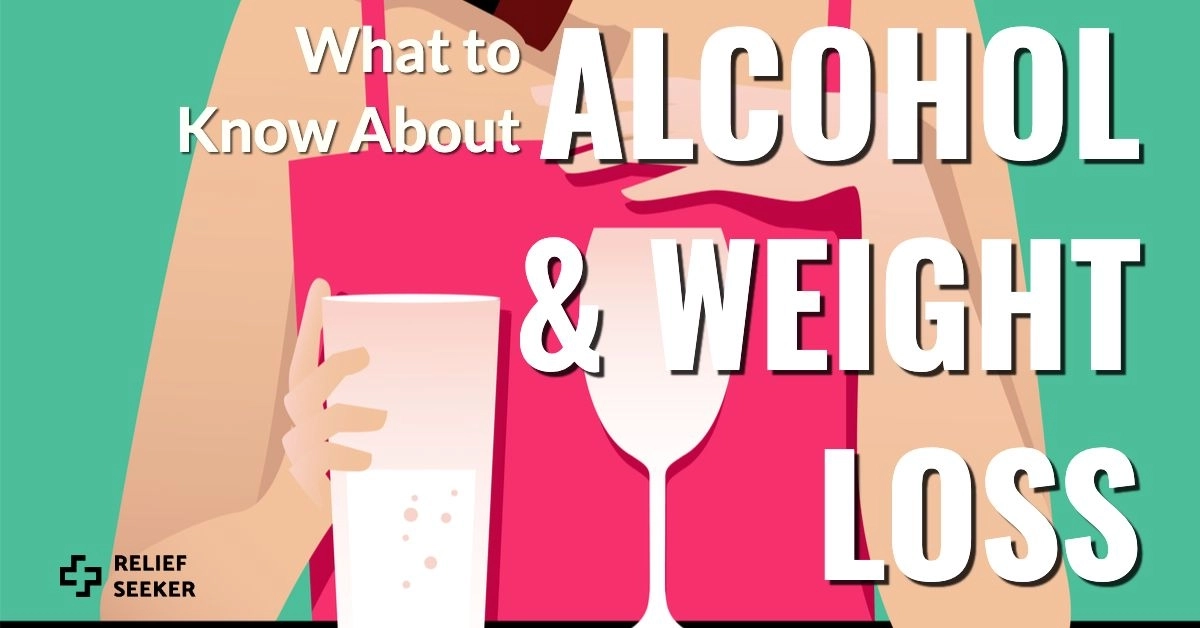Alcohol and weight loss just don’t seem to go together.
Though it may seem enticing to consume alcohol when on a diet to take the edge of your healthy eating plan, you may want to consider those empty calories you’re drinking.
Alcohol can derail weight loss goals in so many ways. From dehydrating our bodies’ systems to flooding the liver and kidneys with toxins, alcohol is one of the least healthy substances we consume.
Find out how to drink alcohol responsibly while losing weight, and discover how to cut back on alcohol (or quit drinking it altogether).
How Alcohol Affects Weight Loss
Alcohol can negatively affect weight loss in so many ways. Not only is it high in calories and sugar, but it can lower your inhibitions and stimulate your appetite, leading you to eat even more empty calories.
Adds Empty Calories
One of the main reasons that alcohol and weight loss just don’t go together is that alcohol is full of empty calories.
The calorie count of one regular beer may be as high as 300 calories (or possibly more)! Beverage calories are often considered ‘empty’ calories because they don’t contain any nutritional value. While these beverages are admittedly pretty tasty, they just don’t do anything to help fill you up and keep you satiated.
Alcoholic beverages like daiquiris, margaritas, and piña coladas are particularly high in calories and should be avoided if you’re trying to lose weight.
Causes Dehydration
If you want to lose weight, you need to drink plenty of water. Water helps break down fat (which your body needs to do before it releases it). If you’re dehydrated, your body can’t break down and release fat.
Alcohol causes dehydration. It’s a diuretic, meaning it flushes the fluids from your body.
If you’re trying to lose weight, you’ll want to ensure you stay hydrated — especially if you’re drinking alcohol. A good rule of thumb is to drink one full glass of water between alcohol servings (more if possible). Limit yourself to one-to-two alcoholic beverages per day (less if possible).
Increases Mental Health Issues
Alcohol is a depressant and can lead to mental health issues, including depression and anxiety. If you drink too much one day and feel depressed the next day (often dubbed the booze blues), you’re probably experiencing a major dip in serotonin.
Alcohol can make you feel great while you’re imbibing because it can activate GABA receptors (feel-good receptors) and block your glutamate (anxiety-inducing transmitters). When your glutamate is blocked for an extended period of time, your body notices something is out of balance and goes into overdrive to lower GABA and increase glutamate. If you continue drinking, you’ll start the process all over again (which is why we can often over-imbibe).
But eventually, you’ll need to stop drinking and your body’s defense mechanisms will win. Drinking more than 1.5-to-2 drinks can cause anxiety and depression, either the night you drink the alcohol or the day after.
Lowers Metabolism
Alcohol is basically a toxin. When you drink alcohol, your body needs to stop focusing on metabolizing fat to focus on metabolizing the alcohol. Since the body sees alcohol as a toxin that it needs to rid itself of, it will focus on metabolizing the alcohol before fat.
Essentially if your body is constantly metabolizing alcohol, it won’t metabolize your fat, and you won’t be able to release said fat cells.
Alcohol is also a stimulant, and stimulants can negatively affect your hormones. Imbibing in a few cocktails can actually stimulate your parasympathetic nervous system (fight-or-flight hormones), shutting down all non-essential functions (including your digestive system).
If you’re focusing on increasing your metabolism, alcohol may be canceling out (or at least negatively affecting) your efforts.
Lowers Sleep Quality
In order to release weight, we need good-quality sleep. Our bodies cannot release fat cells without getting a minimum of seven hours of shut-eye each night. In fact, the body releases weight even as we sleep.
Not only that but failing to get quality sleep may also lead to making poor decisions the next day. You’re more likely to skip a workout, drink a sugary latte, or indulge in refined carbs if you’re feeling exhausted.
What does this have to do with alcohol? Imbibing in alcoholic beverages can mess with your sleep hormones and lead to low-quality sleep. Yes, drinking alcohol may lull you into dreamland faster than if you abstained altogether, but you’re more likely to wake up during the night or fail to enter deep, REM sleep (thanks to your body spending its energy processing the alcohol instead of shutting down to sleep).
Stimulates Appetite
If you’ve ever found yourself snacking during happy hour, you’re not alone. Alcohol has been used as an appetite stimulant for hundreds (if not thousands) of years.
Drinking alcohol can actually flip a switch in your brain and trick your body into starvation mode, increasing your food intake. Sadly, it doesn’t just tell your brain to eat more food, but it also lowers your inhibitions when it comes to food choices — meaning you’re more likely to reach for a bag of chips instead of a bag of carrots when you’re tipsy.
Eating salty snacks with alcohol can also further dehydrate you, creating even more chaos in your body.
Best Alcohol for Weight Loss
If you don’t want to quit drinking altogether, you’re not alone. Millions of people find that enjoying an alcoholic beverage here and there is actually a pleasant reward for sticking to their weight-loss goals earlier in the week.
Yet, not all alcohol was created equally. If you’re trying to lose weight, you may want to stick to the following beverages (and you’ll definitely want to drink them in moderation).
Dry Wine
Opt for any alcohol with low sugar content, such as dry wine. These beverages tend to have fewer calories (and obviously less sugar).
This means you’ll want to steer clear of any sweet wines, dessert wines, or sugary mixed drinks. If you don’t know what’s in a drink, don’t opt for it.
Some dry wines that contain around 100 calories per serving include:
Prosecco
Red wine
Sauvignon blanc
85 milliliters of red wine contains under 100 calories and is probably the best alcoholic beverage to drink (in moderation) if you want to lose weight. Some research suggests that red wine may also tote some heart-healthy benefits — as long as you stick to one glass or less per day.
Prosecco (or any dry sparkling wine) contains between 90 and 100 calories per serving. As an added bonus, bubbly is usually served in a champagne flute, which holds less liquid than a traditional wine glass. Just make sure you’re buying prosecco, brut, or cava, as bubbly wines such as Moscato contain more sugar.
Sauvignon blanc is another decent choice, as a glass contains around 120 calories for a five-ounce pour. If you’re opting for white wine, just make sure it is a dry white wine and avoid any sweet wines, like riesling.
Light Beer
If you’re a beer lover, you may not want to cut out your hoppy treat altogether while trying to lose weight. Just opt for a low-calorie or low-carb beer. There are plenty of light beers on the market that contains fewer than 100 calories per serving.
You may also want to double-down on your efforts by opting for a non-alcohol beer. These beers are gaining in popularity and are available all over the U.S. You can even find craft non-alcoholic beers. You’ll find craft non-alcoholic beers that contain fewer than 100 calories (some even contain around 50 calories per serving!).
Liquor & Soda Water
Liquor gets a little trickier when it comes to weight-loss. 1.5 ounces of liquor (about one shot) contain the same amount of calories as five ounces of white wine. Liquor also has a higher alcohol content, so you’re more likely to let your inhibitions down, leading to more drinking as well as mindless snacking.
If you don’t like beer or wine, you may want to opt for a shot of liquor in soda water (club soda, seltzer, or sparkling water, not tonic water or soda). Not only is soda water free of calories, but it’s also none other than h2O, meaning you’ll hydrate as you drink.
Just make sure to keep drinking water between alcoholic beverages, as four ounces of soda water mixed with alcohol doesn’t equate to one full glass of water.
It’s also important to note that liquor isn’t the same as liqueurs, which contain a lot of sugar and added calories.
Resources for Cutting Back/Quitting Alcohol
If you want to cut back on alcohol or quit altogether, there are plenty of resources to help you achieve your goals and maintain sobriety.
Dry Days
One of the easiest ways to cut back on your alcohol consumption is to institute dry days, weeks, or months. Or, simply quit drinking for a specified amount of time.
When you stop drinking, your body starts to metabolize fat faster. It doesn’t spend so much energy on processing alcohol or storing toxins in your fat.
January is one of the most popular months to make ‘dry’, but it isn’t always the best month to do so. Most people make a huge list of New Year’s resolutions, and many are forgotten by February.
If you want to stick to your dry goals, make them achievable. Consider starting by instating dry goal days throughout the week — and stick to them. Even if you designate one day (like Sunday or Monday) as your dry day to start, you’ll save 100-to-200 calories per week (which equates to about 12 pounds a year).
Try cutting out all alcohol for a week, and then work your way up to a dry month. If you're like most people, you probably need a little extra encouragement--there's an app for that! Less is a free app that can give you the extra motivation you might be looking for by helping keep you accountable on a daily basis when it comes to alcohol consumption.
Note: if you’re concerned you are addicted to alcohol, you shouldn’t delay treatment. Contact SAMHSA’s National Helpline at 1-800-662-HELP (4357).
Opioid Blockers
Opioid blockers are slightly new to the alcohol-free party. These blockers come by way of prescription medication or herbal supplements. Take them up to 45 minutes before drinking an alcoholic beverage, and they’ll block your opioid receptors and dull or completely block your euphoric buzz.
(Note, opioid blockers may not prevent you from becoming inebriated — just from enjoying the sensation; you should never operate a vehicle or heavy machinery after consuming alcohol).
Some people take opioid blockers after their first drink, allowing them to enjoy the first glass of wine, beer, or a cocktail — but preventing them from going overboard later.
Talk to your doctor or healthcare professional to see if opioid blockers are right for you. Only purchase herbal supplements from trusted retailers.
Talk Therapy
Sometimes we drink to relax or to be social. But oftentimes we drink to dull emotional pain. It’s common to want to drink after a tough day at work or when we’re feeling lonely. Yet when we dull these feelings instead of dealing with them, we simply stuff them down — and they end up festering just underneath the psyche’s surface.
Instead of drinking your feelings, you might want to consider talking to a therapist. Online therapy platforms like Talkspace can match you with a therapist that specializes in distracted drinking or alcohol abuse.
These platforms also allow you to contact your therapist via video, text, or voice message whenever you need help. Day or night. Though it may be several hours before you get a response, simply typing or talking about your feelings may help you at least notice your negative patterns instead of turning away from them.
Support Groups
If you’re already in therapy or are concerned that therapy isn’t the right path, you may want to consider joining a support group. There are support groups that specialize in distracted drinking, alcohol abuse recovery, and cutting back on drinking.
Online support group platforms like Wisdo can match you with a partner that has ‘been through’ issues related to alcohol. Chat online whenever you need a little extra support and guidance.
Alcoholics Anonymous
Heavy drinking (such as binge drinking) can lead to a huge host of health problems, including kidney disease, liver failure, and more.
If you believe that your drinking has gotten out of hand, you may want to get help. Alcohol recovery programs like Alcoholics Anonymous can help you release the need to control your addiction and recover.
If you need help, you can always call SAMHSA’s National Helpline at 1-800-662-HELP (4357) for information on treatment programs and counseling.


